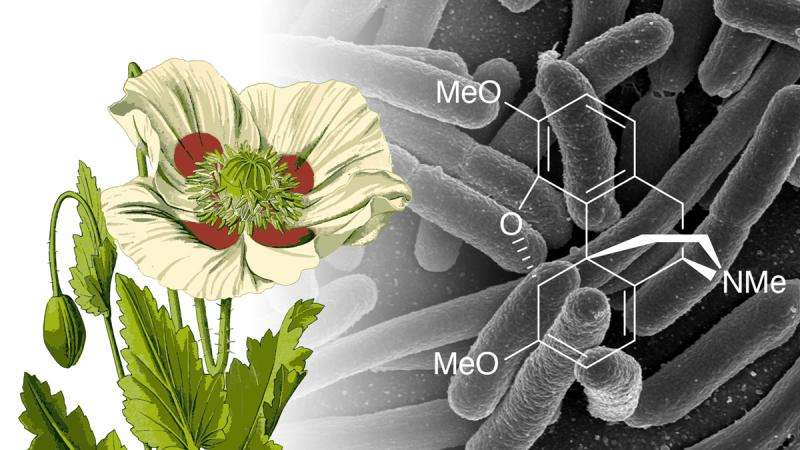Genetically modified E. coli pump out morphine precursor

A common gut microbe could soon be offering us pain relief. Japanese bioengineers have tweaked Escherichia coli genes so that they pump out thebaine, a morphine precursor that can be modified to make painkillers. The genetically modified E. coli produces 300 times more thebaine with minimal risk of unregulated use compared to a recently developed method involving yeast.
"Morphine has a complex molecular structure; because of this, the production of morphine and similar painkillers is expensive and time-consuming," said study author Fumihiko Sato of Kyoto University. "But with our E. coli, we were able to yield 2.1 miligrams of thebaine in a matter of days from roughly 20 grams of sugar, as opposed to 0.0064 mg with yeast."
Morphine is extracted from poppy sap in a process that results in opiates such as thebaine and codeine. Other synthetic biologists have recently engineered the yeast genome so that it produces opiate alkaloids from sugar. There were ethical concerns, however, including a risk that the pain-killing molecules could be produced easily and unregulated, provided that one has access to the necessary yeast strain.
With E. coli, Sato says that such production risk is insignificant.
"Four strains of genetically modified E. coli are necessary to turn sugar into thebaine," explains Sato. "E. coli are more difficult to manage and require expertise in handling. This should serve as a deterrent to unregulated production."
In 2011, Sato and colleagues engineered E. coli to synthesize reticuline, another morphine precursor that appears earlier in the transformation process than thebaine. In the new system, the team added genes from other bacteria and enzyme genes from opium poppies, Coptis japonica, and Arabidopsis. The team credits the strong activity of enzymes in the new system for their success in making thebaine, and hopes to achieve further improvements.
"By adding another two genes, our E. coli were able to produce hydrocodone, which would certainly boost the practicality of this technique," Sato said. "With a few more improvements to the technique and clearance of pharmaceutical regulations, manufacturing morphine-like painkillers from microbes could soon be a reality."
More information: Akira Nakagawa et al. Total biosynthesis of opiates by stepwise fermentation using engineered Escherichia coli, Nature Communications (2016). DOI: 10.1038/ncomms10390
Journal information: Nature Communications
Provided by Kyoto University





















